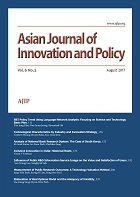Research towards New Innovation Strategies in Korea via Focused Group Method
곽재원 (가천대학교)
김현철 (한국산업기술진흥원)
Abstract
As the COVID-19 pandemic crisis left developing countries with economic setbacks, it is high time to highlight that innovative technologies lead the digital economy. The big powers including the United States and China are already implementing industrial policies that involve large-scale fiscal expenditures to secure the lives and safety of their people. To prepare for the future up to 2025, this paper reflects opinions of industry-academia-research experts regarding changes in the external environment and industry trends. By reflecting results of focus group interviews and changes in the external environment and industry trends, a new high-level 5X strategy (Digital Transformation, Energy Transformation, Bio Health Transformation, Supply Chain Transformation, and Research Transformation) to solve national tasks required for the existing ten policy demand fields and ten agenda during lower-level policy implementation stages were derived.
- keywords
- Industrial Technology Innovation, Focus Group Method, New Innovation Strategies, Five Transformations, Ten Agenda
참고문헌
Accenture (2020), The Circular Economy Handbook, 13 January.
Loker, A. (2020), COVID-19 and the US Lettuce Supply Chain: Implications for Farmworker Health and Safety and a Secure Supply, De Gruyter, 16 Sep 2020
Congressional Research Service (2022), Industrial Policy and International Trade, 23 May 2022
European Commission (2020), A European Green Deal. 11 Mar 2020
European Commission (2022), EU research and innovation and the invasion of Ukraine: Main channels of impact, 25 April 2022
WBCSD (2021), VISION 2050 TIME TO TRANSFORM, 25 Mar 2021
Bitkom (2019), A sovereign cloud and data infrastructure for Germany and Europe, 15 Nov 2019
Bloor M, Frankland J, Thomas M. and Robson K. (2001), Focus groups in social research. London: Sage Publications.
Cyr, J. (2015) The Pitfalls and Promise of Focus Groups as a Data Collection Method, Sociological Methods and Research, 45(2), pp. 231-259. https://doi.org/10.1177/ 0049124115570065
Deloitte (2019), The Future of work in manufacturing, 15 Nov 2019
Fernando, A, Lenore, F, Anthony, P. C, Richard, T. C and Jochen, A. G. (2018), Environmental challenges for the Belt and Road Initiative, Nature Sustainability, pp. 206-209, 15 May 2018
Gill, P., Stewart, K., Treasure, E. and Chadwick, B. (2008) Methods of data collection in qualitative research: Interviews and focus groups, British Dental Journal, 204(6), 291-295.
Greenwood, M., Kendrick, T., Davies, H. and Gill, F.J. (2017), Hearing voices: Comparing two methods for analysis of focus group data, Applied Nursing Research, 35, 90-93.
Ha, W.G. and Choi, N.H., (2015) The 4th Industrial Revolution, Seoul: Contentshada, December. (Korean)
Hyde, A., Howlett, E., Brady, D., Drennan, J. (2005), The focus group method: Insights from focus group interviews on sexual health with adolescents, Social Science and Medicine, 61(12), pp. 2588-2599. https://doi.org/10.1016/j.socscimed.2005.04.040
Hyundai Economic Research Institute (2017), Recent economic losses between Korea and China and countermeasures, May.
Joint ministries (2020), Bio industry innovation policy direction and core tasks, 15 Jan 2020.
Joint ministries (2019), Biohealth industry innovation strategy, 22 May 2019.
Kim, H.J (2021), EIB’s circular economy guide and financial support, Weekly KDB Report, 31 May 2021.
Kim, H. Y. and Park, Y.S. (2007), Forecasting Korea’s Quarterly GDP-The Behaviour of Manufacturing Inventory, Journal of The Korean Data Analysis Society, 9(10), pp. 241-255.
KOTRA (2019), Overseas regional innovation success stories and implications, Global Market Report.
Krueger, R.A. (1998), Moderating focus groups. London: Sage Publications.
Laestadius, L.I., Penndorf, K.E., Seidl, M. and Cho, Y.I. (2019), Assessing the appeal of Instagram electronic cigarette refill liquid promotions and warnings among young adults: Mixed methods focus group study, Journal of Medical Internet Research, 21(11), e15441.
Ministry of Trade, Industry and Energy (2017), Full-scale start of the 4th industrial revolution by building bio big data, 17 Apr 2017.
Ministry of Trade, Industry and Energy (2019), Leap to become a world-class hydrogen economy leader; Government announces roadmap to revitalize hydrogen economy, 17 Jan 2019.
Moon, Y.H. and Seol, S.S. (2017), Asian Journal of Innovation and Policy, 6(3), 245-261.
Morgan, D.L. (1998), The Focus Group Guide Book. London: Sage Publications.
OECD (2019), Review of national policy initiatives in support of digital and AI-driven innovation, 17 Oct 2019
OECD (2019), Innovation support in the enterprise sector, 17 Oct 2019.
Park, M.S, Sohn, W. B., Lee, H. B. and Hahn, S. Y. (2020), Comparative study on new industry policy transition according to the crisis, KIAT, 31 Dec 2020.
Park, S. U. and Kim, H. K. (2021), Research on Industrial Technology Innovation, KIAT
Park, S.U. and Kwon, K.S. (2020), Forecasting Korean National Innovation System and Science & Technology Policy after the COVID-19, Asian Journal of Innovation and Policy, 9.2:145-163.
Ra, S.S., Unika, S., Sameer, K, Yoon, S.W. and Kwon, K, (2019), The rise of technology and impact on skills, International Journal of Training Research, pp.26-40, 07 Sep 2019.
Rosenthal, M. (2016), Qualitative research methods: Why, when, and how to conduct interviews and focus groups in pharmacy research, Currents in Pharmacy Teaching and Learning, 8(4), pp. 509-516.
Schwab, K. (2016) The 4th Industrial Revolution, World Economic Forum.
Seol, S.S. and Ko, C.R. (2020) Lessons from Korea’s Response to COVID-19: Missing Factors of Sectoral Innovation System, Asian Journal of Innovation and Policy, 9(2), 106-132. DOI: http//dx.doi.org/10.7545/ajip.2020.9.2.106
Stewart D W, Shamdasani P.M. (1990), Focus groups. Theory and practice. London: Sage Publications.
- 다운로드 수
- 조회수
- 0KCI 피인용수
- 0WOS 피인용수


